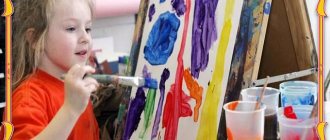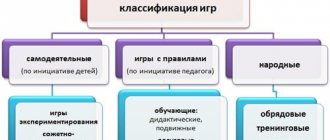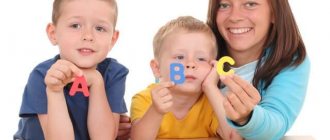Definition 1
The preschool education system is a complex of educational institutions, training programs, management frameworks, patterns and principles for the implementation of educational activities at the preschool age stage of personality development.
The preschool education system plays a key role in the development of the personalities of the younger generation. Therefore, careful organization of training at this level and the construction of an optimal system focused on the implementation of the concept of education at the current stage of development of the social environment and meeting the needs of society for educational services are required.
Figure 1. Preschool education system in the Russian Federation. Author24 - online exchange of student work
Are you an expert in this subject area? We invite you to become the author of the Directory Working Conditions
Model of a modern preschool education system
At the present stage of development of society, the preschool education system includes the following blocks, the functioning and development of which are interconnected and interdependent:
- Principles of building preschool education. Currently, the preschool education system is based on the following principles:
- The principle of dynamism. It involves the dynamic development of educational and upbringing processes in accordance with the progress of society and the intensity of its processes;
The principle of variability of organizational forms. It means that preschool educational organizations operating in Russia can be presented in different forms, aimed at meeting various educational needs. At the moment, there are many types of educational institutions and there is variability in the educational services provided;
- The principle of flexibility. It involves a quick response to changes occurring in society, the needs of society for education and the needs of the individual;
- The principle of integrity of the educational process. It is associated with the orientation of educational programs of various types and types towards the development of the personality of each individual child.
- Preschool education programs. They are characterized by the variability of their content and directions of development while focusing on common educational goals and objectives.
- Pedagogical technologies used in the preschool education system. They are related to the implementation of preschool education programs and the implementation of an individual approach to each pupil. Therefore, pedagogical technologies are characterized by variability, flexibility and dynamic use.
- Subject-developing spatial environment. It is a necessary condition for the full development of the younger generation, and therefore, an important component of the preschool education system, without which its full and productive functioning is impossible.
- Teaching staff. The qualifications of modern preschool teachers require their continuous professional growth and development. This is necessary for the implementation of variable educational programs in the preschool educational system and the use of variable pedagogical technologies.
Finished works on a similar topic
Course work Modern system of preschool education 410 ₽ Abstract Modern system of preschool education 250 ₽ Examination Modern system of preschool education 220 ₽
Receive completed work or specialist advice on your educational project Find out the cost
The modern model of preschool education involves the use of variable educational programs that determine the content of the preschool stage of education, the focus of activities, the degree of complexity and guarantee the full and comprehensive development of the younger generation.
The main educational program of a preschool educational institution determines the specifics of building the life activities of children within the walls of a preschool institution, focused on the comprehensive development of each pupil. This is implemented through the inclusion of varied children’s activities in the educational program, presented in the following forms:
- Classes of different directions are a form of educational activity for preschoolers.
- Unregulated types of activity are a form of work that is not included in the regulations of the preschool educational institution.
- Free time – providing children with independent time, socializing in groups, playing and interacting with peers.
At the present stage of development of society, the model of preschool education is based on public-private partnership in the provision of educational services. This means that there are preschool-type educational institutions under the jurisdiction of state authorities, and there are private preschool institutions. Each institution has the right to use its own educational program, adapting to the needs of different families.
Figure 2. Features of modern preschool education. Author24 - online exchange of student work
Information and educational environment
Within the framework of a unified educational information environment, the formation and development of an innovative education system equipped with organizational, pedagogical and information technologies is taking place. In this environment, architectural and structural solutions provide open standards for interfaces, formats and communication protocols to ensure mobility, stability, efficiency and other positive characteristics achieved by creating open systems.
The purpose and principles of modern education are aimed at preparing students for full and effective participation in the social and professional spheres in market conditions. Giving the education system the qualities of an open system means a radical change in its characteristics towards greater freedom in educational planning, choice of place, time and pace, in the transition from the principle of “education for life” to the principle of “education for life”. In practice, this system is implemented using network technologies. Initially, online learning technologies were widely used by those age and social groups who were forced to give preference to learning in the workplace.
Today, open and distance learning provides various segments of the population with the opportunity to improve their level of education using the Internet. Many Russian universities actively use information and network technologies in the full-time education system. As a result, the more effective use of modern educational technologies in the traditional education system is gradually erasing the differences between full-time, correspondence and distance learning, which is a characteristic feature of the innovative education system.
At the present stage, global changes in the goals and content of education are focused on the development of a qualitatively new model that prepares a person for life and activity in a post-industrial society and equips him with completely new personal qualities and skills necessary for these conditions. All this places new demands on specialists.
The modernization of the Russian education system and the introduction of information and communication technologies into the educational process raise the question of the quality of education in a new way. And today, many countries pay great attention to the problems of the quality and effectiveness of education and combine their efforts in developing methodology, technologies and tools for comparative studies of the quality of education, creating a system for monitoring the quality of education in the world.
Today, a new model of specialist training is being formed in the Russian education system, which takes into account not only the qualification model of a specialist, but also the competency model. The competence of a specialist includes knowledge, abilities, skills, as well as the method of their implementation in activities and communication. In the competency-based model of a specialist, the goals of education are related to interdisciplinary integrated requirements for the result of the educational process. In the first place are the qualitative characteristics of the individual, formed by modern educational technologies. This is not so much about control of knowledge, skills and abilities, but about the quality of the education system.
Training and retraining of teachers is an important area of improving the quality of education. The quality of professional education largely depends on teachers. Universities have a system of advanced training for teachers, which fully meets the requirements of our time and pays great attention to new technologies in education. For example, at the Moscow State Law Academy named after O.E. Kutafin at the Institute of Additional Professional Education, advanced training of the academy's teaching staff is carried out within the framework of the following short-term advanced training programs “Transition to two-level higher legal education based on a competency-based approach”, “Improving the information competence of university teachers” based on innovative educational technologies.
Variability of preschool education programs
The modern education system is represented by six types of preschool educational institutions, therefore, educational programs aimed at preschool educational institutions are presented in various options. At the same time, the Federal State Educational Standards for Educational Institutions have been established, regulating the implementation of educational programs of preschool educational institutions and putting forward requirements for their development.
All preschool education programs are divided into two types:
- Comprehensive programs are general developmental programs focused on the implementation of education in all main areas of child development: physical, social, speech, moral, cognitive, artistic and aesthetic, communicative, personal. These programs include activities to reveal the child’s basic abilities, activate his creative potential, cognitive abilities and develop special types of children’s activities characteristic of a specific age group: subject, play, art, theater, music, design.
- Partial programs are specialized programs focused on the development of preschool children in a specific area. These could be health conservation programs, remedial education programs, environmental and patriotic development programs, programs for mastering non-standard activities (early reading, handicrafts, cooking, etc.).
News for schoolchildren
The Ministry of Education has approved new Federal State Educational Standards for primary and secondary classes. They will come into force on September 1, 2022. Perhaps, for the Russian education system this is one of the most important documents. It is clearly stated here, much more clearly than in the previous version, what children after the 4th and after the 9th grade should know and be able to do. Based on these standards, specific programs for schools and curricula will be developed, textbooks will be written and Unified State Examination tasks will be compiled.
So, in 2022, we can expect such innovations in preschool education in 2022.
New modules inside items
From 2022, primary school children will be taught how to handle money.
How are teachers and parents worried? Will there be a new item? The Ministry of Education reassured us: there will be no new subjects and the workload on schoolchildren will not increase. But new “modules” will appear inside some “old” items.
In the beginning, children will study these skills as part of the subjects “The World around us” and “Mathematics”. For example, the learning outcomes for the subject “Mathematics” for primary school state “the use of basic mathematical knowledge in solving educational and practical problems and in everyday situations to describe... phenomena... including in the field of personal and family finance.” And in the “okruzhayka” there is another aspect: the protection of personal information, including financial information - in reality and in the virtual space.
In basic school, from the 5th grade, children will begin to learn financial issues more deeply: they will be told how to protect savings from scammers and how to use funds rationally. And all this will also be organically included in several items:
- Social science;
- Computer science;
- Geography, etc.
The management believes that if the school is ready, has a base and specialists, then it is necessary to introduce the study of financial literacy, cybersecurity, and programming, because this is useful and in demand in the modern world.
Cancellation of compulsory 2nd foreign language
If in the 2021-2022 academic year officially a second foreign language remains mandatory for study in Russian schools, then from September 1, 2022 this norm will be abolished, and parents themselves will be allowed to decide how many languages the child will learn.
In fact, except for special language schools, and we don’t have many of them in our country, a second language in high school was a profanation. This must be admitted, many teachers believe. “He either did not exist at all, or he took up little time in the children’s lives.
That is why, already in the 2021-2022 academic year, many directors allowed parents of 5th graders to decide on the issue of learning a 2nd language. Thus, some schools still decided to maintain the opportunity to study a second foreign language, in particular Chinese. True, teachers and school principals are afraid that “spears” will fall for this, whether this will be a violation of the Federal State Educational Standards?
The fact is that the number of lessons and the period for studying any subject are not regulated in the Federal State Educational Standards. If fifth-graders, by decision of school parents, do not start studying it this year, there will be no violation. It is important that children do not lose the opportunity to study it, and that parents do not complain that this opportunity was taken away from them. The most important thing for the director is to competently draw up a curriculum so that parents, students, and teachers are satisfied.
OGE and Unified State Exam news
The return of the full-length OGE and USE in 2022 has become news No. 1 in school education, and graduates of the 2021-2022 academic year will have to take the State Exam as in the “pre-Covid” period.
“We see that all year the last graduating class hoped that the exams would be cancelled... Now I don’t want to announce that there will be no exams. Our proposal, which we submitted for consideration... to the Ministry of Education, is to return to the procedures that were... These are two compulsory subjects and two elective subjects,” Muzaev said during a meeting with parents of schoolchildren.
Thus, 11th graders who did not choose specialized mathematics at the Unified State Exam will have to take 2 compulsory subjects:
- Russian language;
- basic level mathematics.
You can read more about the innovations of 2022 in our articles on “FIPI OGE 2022” and “New rules for passing the Unified State Exam in 2022”.
Inclusive education
Almost a third of Russian schools and a fifth of kindergartens today are accessible for joint education of students with disabilities and limited health capabilities with their peers.
Speaking at the VI International Scientific and Practical Conference “Inclusive Education and Society: Strategies, Practices, Resources,” Deputy Minister of Education of the Russian Federation Denis Gribov clarified that, according to monitoring data from the Ministry of Education of Russia, in 2020 in Russia there were:
- 10.1 thousand (28% of the total) inclusive schools;
- more than 8 thousand (21.8% of the total) inclusive kindergartens.
Denis Gribov emphasized that in the regions it is important to continue working to create special educational conditions at all levels of education; new buildings of educational organizations must be built taking into account the accessible architectural environment and the necessary special equipment. It is also important to train the teaching staff of kindergartens and schools in methods of working with such children.




